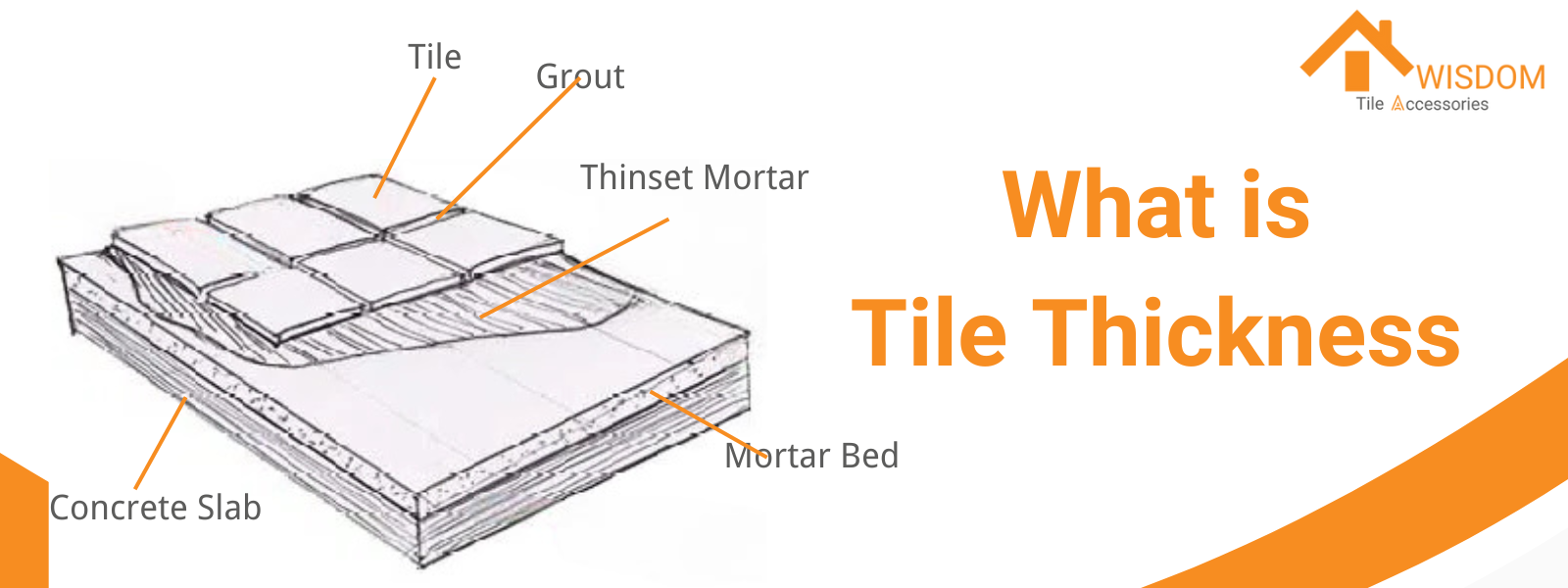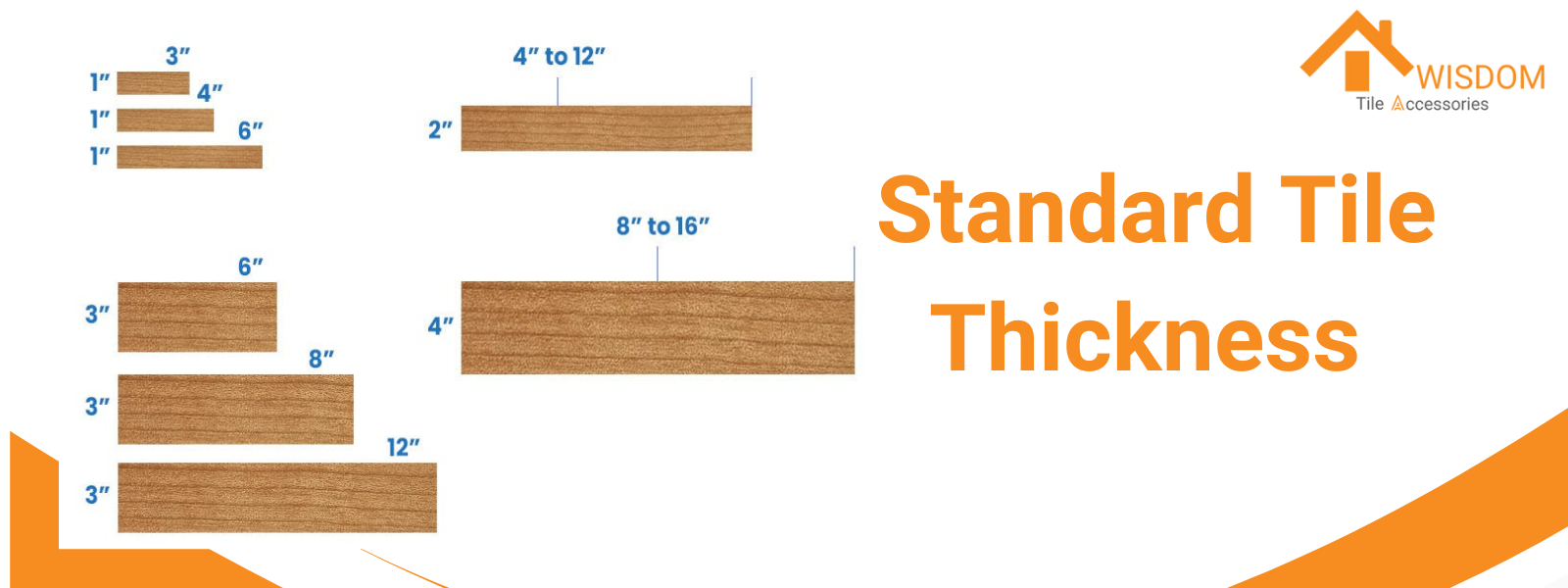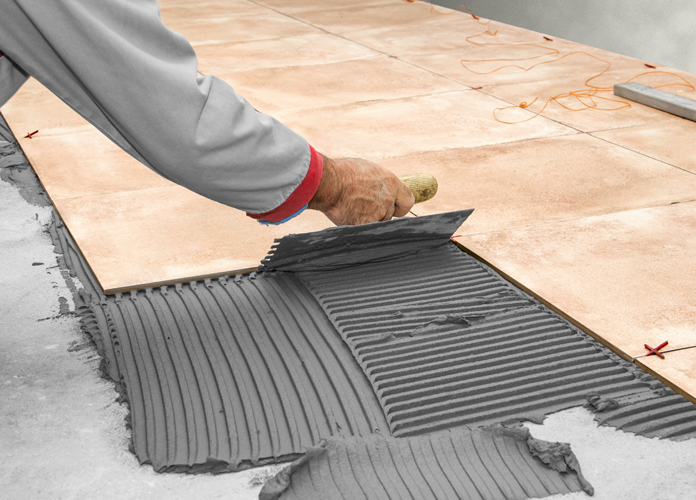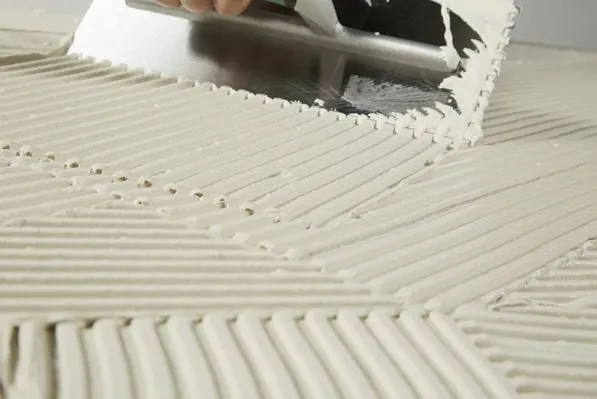When installing tiles, have you considered the thickness aspect? The industry adheres to strict standards for tile thickness, which varies among different tile types such as ceramic, porcelain, and vinyl.
This article aims to elucidate the standard thicknesses for 8 distinct tile varieties, aiding you in identifying the necessary dimensions. It’s beneficial for both tile installers and those keen on understanding building norms.
You’ll learn about various aspects like:
- the standard tile thickness
- how thick ceramic and porcelain tiles are
- the typical thickness of wall tiles
- the considerations for subfloor thickness for tile installations

What is Tile Thickness
Tile thickness is defined by the measurement from the bottom to the top surface, typically in millimeters (mm). It ranges from 3mm for ultra-thin tiles to 20mm for thick tiles used in outdoor applications. This measurement is influenced by the tile's material, intended use, and size, with larger tiles requiring a thicker profile for durability.
Tiles can vary in thickness, typically from 6mm to 20mm, depending on materials, purpose, and specifications. Types like ceramic, porcelain, and natural stone each have distinct thicknesses. Wall tiles and decorative items usually fall within 6mm to 10mm.
Standard average thickness ranges from 1/4-inch to 3/8-inch. The thickness chosen depends on the tile type and its intended use. For example, floor tiles are generally thicker than wall tiles to withstand foot traffic and wear. The use of thinset with tiles varies but is not typically more than 3/16 of an inch thick.

Standards for Different Tile Materials
Ceramic Tile Thickness
- Thin Tiles: Tiles less than 5 mm in thickness are usually reserved for wall applications due to their lightweight nature, which makes them suitable for vertical surfaces.
- Standard Thickness Tiles: These are versatile and can also be utilized on walls. They typically range from 1/4- to 3/8-inch (about 6 to 10 mm) in standard thickness, offering a balance between durability and ease of installation.
- Thick Tiles: For outdoor spaces or countertops where durability and the ability to withstand heavy loads or weather conditions are paramount, tiles with a thickness of 12 mm or more are recommended.
It's vital to adhere to industry standards and guidelines when selecting tile thickness. The Tile Council of North America (TCNA) and International Organization for Standardization (ISO) provide comprehensive guidelines and standards, including thickness specifications. Additionally, always consider the manufacturer's recommendations for specific products to ensure optimal performance and longevity of the installation.
Porcelain Tile Thickness
Porcelain tile thickness varies to accommodate different applications, ranging from indoor to outdoor use. Standard porcelain tiles typically range between 1/4- and 3/4-inch thick, providing a durable option for flooring, especially in high-traffic areas. In contrast, ceramic tiles generally fall within the 1/4- to 3/8-inch range. The same minimum average thickness applies to both materials, but porcelain tiles are available in thicker options, which are less prone to breakage or cracking.
For specific uses, porcelain tiles come in different thicknesses. Thin-body porcelain tiles, which are about 3 to 6 millimeters thick, offer a lightweight option for walls or areas requiring minimal weight. These tiles demand special care during installation due to their higher susceptibility to damage.
Vinyl Tile Thickness
Vinyl planks and tiles can start from a thickness of 5mm and go up to around 8mm, with some brands offering options as thin as 4mm and 4.5mm.
In commercial settings, vinyl thicknesses of 6-8mm are typically used to withstand heavy foot traffic and furniture wear. This thickness range also offers significant soundproofing benefits, which is especially valuable in environments where noise reduction is crucial for comfort and productivity.
For areas with lower foot traffic, thinner vinyl options ranging from 2mm to 4mm might suffice. These are considered cost-effective solutions for guest bedrooms or less frequently used spaces.
However, they may not offer the same level of durability as their thicker counterparts. It's crucial to consider the specific needs of each space in your home or commercial property to select the appropriate vinyl tile thickness that ensures a balance between performance, aesthetic appeal, and cost-efficiency.
Carpet Tile Thickness
Carpet tiles typically don't exceed a thickness of 10mm, with most high-quality options being around 6-7mm. While the finish can influence the final thickness, it's crucial to note that a thicker tile doesn't automatically signify superior quality. The variety in finishes contributes to the overall thickness but quality is determined by factors beyond just thickness.
Floor Tile Thickness
Floor tiles vary in thickness, typically between one-quarter and three-quarter inches, influenced by the tile's size and material. For instance, ceramic tiles range from 1/4 to 1/2 inch thick, while porcelain tiles can be up to 3/4 inch thick. Smaller tiles tend to be thinner, and it's crucial to ensure all tiles in a project are of matching thickness for a uniform finish.
Wall Tile Thickness
Wall tiles commonly range in thickness from 6 to 10 millimeters. This range is considered ideal for various applications, including bathroom walls. The thickness can vary based on the tile material, with porcelain tiles extending from as thin as six millimeters. Decorative and mosaic tiles also fall within this thickness range, making them suitable for wall applications. It's important to consider the tile's thickness in conjunction with the adhesive bed and any necessary tile trim to ensure a uniform wall surface.
Subway Tile Thickness
Subway tiles, typically thinner than other ceramic or porcelain tiles, have an average thickness of about 3/8 inch (9.5mm), often ranging between 1/4" and 3/8". Their versatility is evident in various applications, from tub surrounds and backsplashes to their namesake subways. Nowadays, there's a trend towards diverse sizes and shapes, with rectangles of varying dimensions offering more variety to meet contemporary design needs.
Shower Tile Thickness
Shower tiles typically measure around 1/4 inch to 5/16 inch in thickness, while the adhesive thin-set used during installation should not exceed 3/16 inches thick. The choice between ceramic and porcelain tiles affects thickness, with standard porcelain tiles often used in showers ranging from 1/4 inch to 3/4 inch thick.
Why Tile Thickness is Important in Construction?
Tile thickness directly influences the longevity and stability of tile installations. Opting for the appropriate thickness ensures tiles can endure foot traffic and environmental conditions, especially in areas prone to moisture, such as showers.


Tile Thickness with Thinset
Thinset, a type of mortar, plays a pivotal role in tile installation. It is used to adhere tiles to the subfloor or substrate. The thickness of thinset mortar under tile is equally important; too thin, and it may not provide adequate adhesion and support, leading to tiles cracking or becoming loose over time. Too thick, and it can result in uneven tile surfaces. The ideal thinset layer is typically around 3/16 inch thick, but this can vary depending on the tile size and type, as well as the substrate's condition.
Subfloor and Substrate Requirements
The integrity of a tile installation significantly depends on the subfloor and substrate's quality and thickness. A sturdy and level base is essential to prevent tiles from cracking, shifting, or lifting. The minimum subfloor thickness for tile installations is typically 1 ⅛ inches of plywood for floors expected to carry standard residential loads. However, this requirement can vary based on the type of tiles used and the specific demands of the project.
For tile floors, the subfloor thickness should be sufficient to support the weight of the tiles, thinset, and any additional layers required, such as tile underlayment or waterproofing membranes. In cases where tiles are being installed over an existing substrate, such as concrete, the surface must be clean, level, and free of any defects that could affect the adhesion of the thinset.
FAQ: Tile Thickness
How thick is backsplash tile?
The thickness of backsplash tiles typically ranges from 3/8 inch to 1/2 inch, with 3/8 inch being the most common and versatile size.
How thick is a 12x24 tile floor?
The thickness of a 12x24 tile floor is typically 3/8 inch. This size is common for various types of floor tiles, providing a balance of durability and ease of installation for areas with regular foot traffic.
